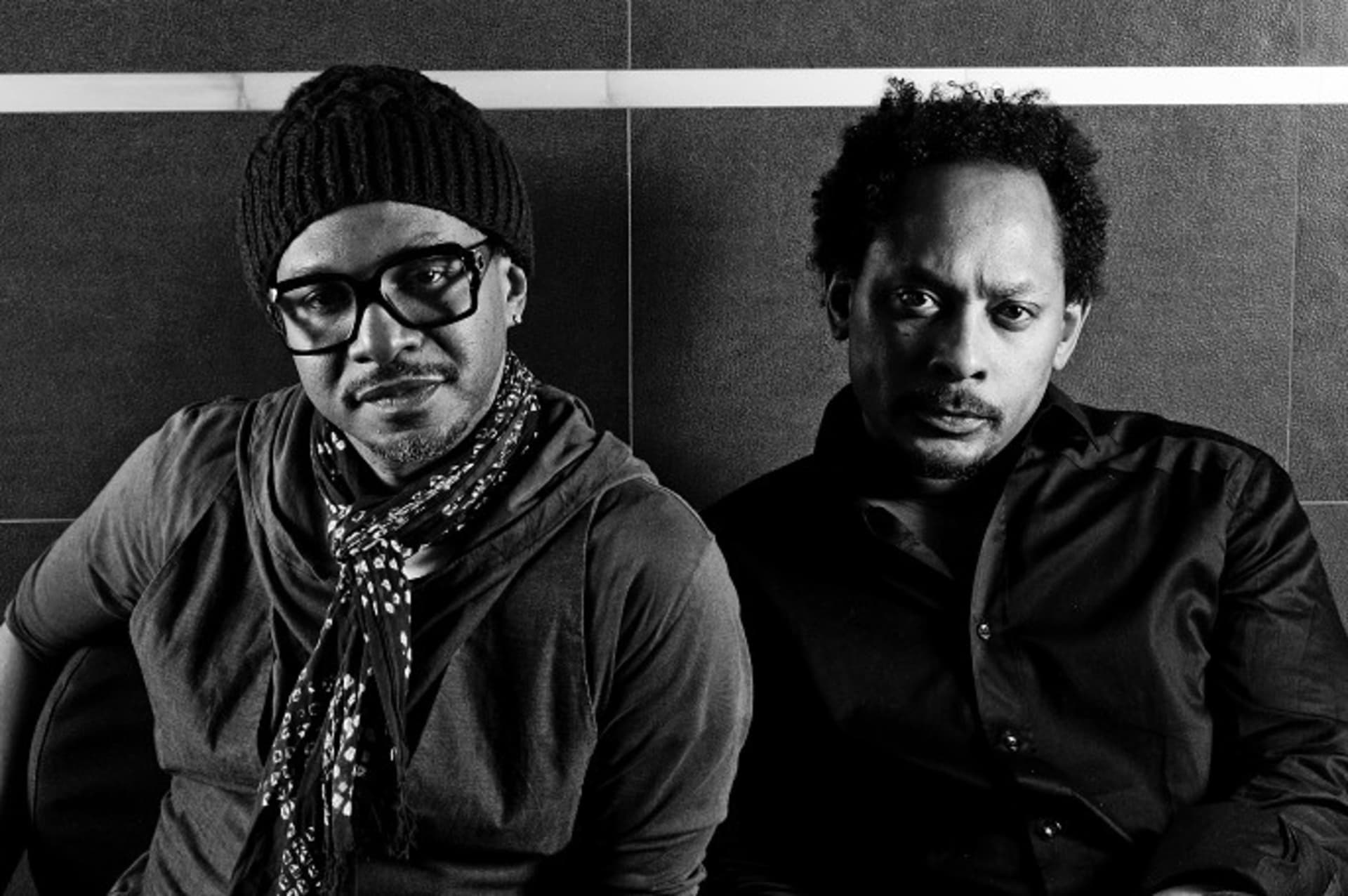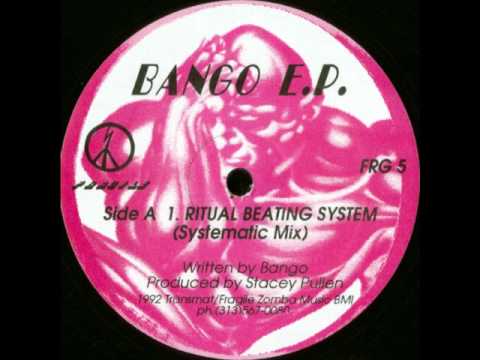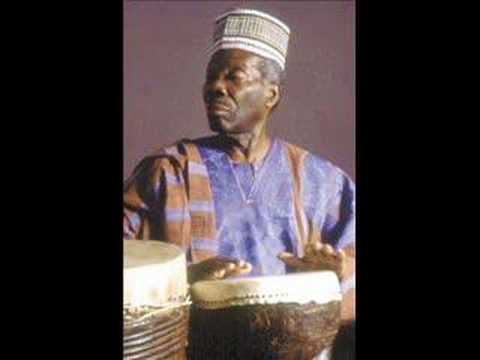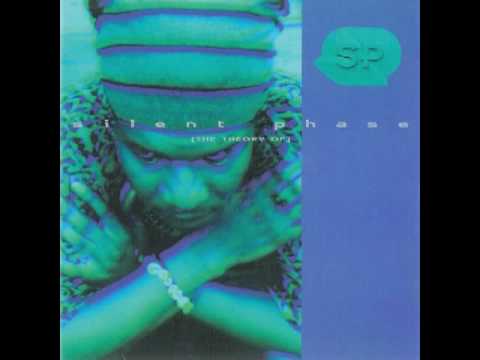
Mentors: Stacey Pullen On Learning the Ropes From Derrick May
I discovered techno around ‘87 or ‘88. After I left college in ‘89 I came back to Detroit and started going down to the Music Institute, which was the first club here that featured Derrick [May] and Juan [Atkins] and the whole Detroit techno movement. I would meet Derrick out every once in a while. He was like a god to me, because here’s this guy making this futuristic music, and for some reason I wanted to be connected with that.
He would play at the Music Institute on a Friday night. His energy and DJing really inspired me to go toward this path. He projected this awesome force when he was DJing that resonated with the crowd on the dance floor. That’s key to being a DJ: you have to be able to connect with the people. His music was a little bit more artistic, a little deeper than Kevin [Saunderson]’s and Juan’s. Juan was more the mysterious guy who always kept to himself; Kevin had Inner City and a lot of things going on. But it was Derrick’s energy and personality, along with his DJing, which attracted me more than anything.
After some time, I gave him a cassette tape with demos. I don’t even think he got around to listening to it until two or three weeks later because he was on the road. This was before the days of the internet and cell phones, so I was just waiting for a call or to see him again. There was no telling when I was going to run into him because he was always touring, and I didn’t know him well enough to go to his house. When he came back the first thing he said was, “Yeah it’s cool, but you need a little bit more work.” Here I was thinking that I’m ready, that he’s gonna like the demo and I’ll release my EP or track very soon.
I think I approached him in the fall of 1990, and I remember saying to myself, “Okay, I would like to have a track out by Christmas 1990, before the end of the year.” That was my mentality. So when he came back to me saying I needed to work a bit longer, it was defeating. I was 20 or 21, still a young buck, man. I was still living at home with my parents. All I knew was that I wanted to be involved with this movement. All those guys had radio shows in Detroit, and I would tune in every week or every night to listen to what they were doing. I would record them to get an idea of where they were trying to go and how innovative they were when it came to the mixing. I was listening for every possible way of getting more inspired by what they were doing.
When we started getting a little bit closer, he invited me to come over to his studio. Jay Denham, who released a track on [May’s record label] Fragile called “Fade to Black”, was working in Derrick’s studio at the time. Whenever Derrick was out of town, Jay Denham would studio-sit, so I would go down there and hang out with Jay and watch what he would do. When he took a break I would get in and do a little bit of work there myself.
I still remember the second demo that I gave Derrick. He told me, “I like this, but these are my sounds. You’re using my sounds on my keyboard. With Detroit techno, we have to be innovative. We have to look deep within ourselves and create our own sound.” So once again, I had to go back and make my own sound with the same keyboards, but create and edit my own presets. At that point, he knew that I was a determined young guy who really wanted push things further.
I was down at his place almost every day. I remember him coming in and listening to one of the tracks that I was working on. He heard the kick drum and was like, “Hold on, the strongest thing in the track has to be the kick drum.” He brought all my levels down to zero, and brought up the kick as the number one thing that was the strongest. And from the kick drum, everything else came in just a little bit lower. He told me the kick drum should be the strongest thing in the mix so you can fill a dance floor, because we’re dealing with dance music. It’s not guitar-based rock music.
I remember him telling me that on Transmat, “we don’t sample. Everything an artist gives me is 100 percent that artist’s creation. Fragile is where the artist can do more creative sampling—not relying on the sampler to make the track, but sampling something that helps you create.” So when it came time for me to release my first EP, it came out on Fragile Records because I sampled a track from Babatunde Olatunji called “Drums of Passion”. He’s a Nigerian percussionist that I was listening to at the time, and I felt that when I started creating techno, I wanted to take a more African approach to the music. I was learning about my heritage, my culture, and I wanted to fuse a little bit of that with techno. So my first track, “Bango”, came out on Fragile when I really wanted to be a Transmat artist, because that’s what I heard first: “Nude Photo”; “Beyond the Dance” and all those. I was a little taken aback, but I was learning about the concepts of techno, and about Derrick’s vision.
After I released my first track on Fragile, which was in 1992, I did my first and only live performance ever in San Francisco in October of that year, and I was touring on behalf of Transmat Records. At this point, I’d had my own release, I had an agent who was working out of Transmat, and Derrick had moved over to Amsterdam. He told me, “Okay, the only way we can continue our friendship, our relationship, our mentorship, is I’ll give you 500 bucks as an advance for your release, and I’ll give you a plane ticket to come over to Amsterdam, so you can see what else is going on outside Detroit.”
That was a big deal! I had money in my pocket and a plane ticket, and that was more than anybody could ask for when two years ago, I didn’t even know this guy. So I wound up going over to Amsterdam and living with Derrick for a year and a half, when I was only supposed to stay over there for one month. I said to myself, “I can go back to Detroit, where there’s not much opportunity for gigs and I’d still be living at home with my mom, or I can come over to Europe and teach the world about Detroit techno and learn about what’s not coming to Detroit.” I got the chance to experience the music from a European perspective while keeping true to my roots in Detroit.
It was like big brother–little brother, you know? I still remember my first gigs with him in Germany in 1993. We did a gig in Frankfurt together, and it was great. It happened on a Saturday. Derrick stayed an extra day, which meant he was coming home on a Monday instead of a Sunday. So me not knowing the ropes of traveling and the music business, the promoter actually asked for me to stay till Monday, but I didn’t know anything about changing flights, so I was like, “No, I gotta go.”
So I went back to Amsterdam, and then Derrick contacts me and he’s like, “What happened?” When I told him that I went back to Amsterdam he said, “Listen, man. You are now a professional traveling DJ. You are able to travel at your will, and you will never be without a gig from this point on. So if the promoter wants you to stay, he’ll take care of the plane ticket being changed. He’ll take care of the accommodation.” I still remember him saying that: “You will never be without a gig as long as you put forth that effort to be the artist that you want to be.” It stuck with me till this day. I’ll never forget that. It also taught me a lot about the industry, about being an artist and dealing with people from a business standpoint, but also keeping lifelong friendships.
Living together changed our mentor relationship for the better because at that point I started recording my album for Transmat. By that time Derrick was working closely with R&S Records. He had a pressing and distribution deal with them and I was working in the studio in Amsterdam and Brussels. He would get studio time for me because he knew I was recording an album, which was supposed to be the first ever album on Transmat.
The funny thing is that Renaat from R&S Records didn’t feel the album. He wanted me to continue working and developing my sound a little bit more, and Derrick was like, “No this guy’s ready. I’ve been really patient with him for three or four years even before we started releasing music.” Renaat disagreed. He said that if I was his artist he would’ve asked me to put more work into the album. There was one track that he really liked on the album, and he preferred me to stay more in that vein, instead of the other stuff, which explored techno from different angles. He liked it, but at the same time he felt that I should have stayed a little closer to techno’s origins instead of fusing it with African music. The track that he liked had nothing to do with where I was mentally.
But Derrick insisted that I was ready. That also told me that he really believed in me. At that point in time, he didn’t have that many artists on Transmat, so he wanted me to be the new young guy to take Transmat to the next level. Looking back, I can see that there was a little bit of a disconnect culturally, but at the same time, he still respected our decision to go ahead with releasing the album.
When Derrick asked me to do a remix or additional production on his track “Wiggan,” which came out on Buzz Records—a Belgian label—in so many words, he said, “I have faith in you now, and I want you to help me remix this track.” For him to say he wanted me to help remix his track, that let me know, okay, I’m validated now. I know how he is when it comes to the music he has released; he’s really strict about what he puts out. So for him to ask me to help remix a track was more than an honor.
He told me to go in the studio. I went in for four or five hours and he came back and listened to each part, and was like, “Man, you did too much. You overproduced it.” I don’t know what he expected me to do, but I went in and re-wrote the track. It wasn’t even a remix—it was a new track, period. I didn’t know how to take it when he told me I did too much, but then I began to understand the process of programming and producing and remixing, and that helped me out. He didn’t say that I did too much to say it wasn’t great—he could tell I put all my heart and soul into it—but I didn’t really leave him much to work with. So he came in and added his touch to the remix, and that’s what you can hear today.
We had our place in Amsterdam for about a year and a half, and when Derrick moved to Paris, I moved back to Detroit. I felt that it was time for me to start laying down my foundation of who I am as an artist outside of being with Derrick. Right after the Transmat album came out, we stopped seeing each other every day. I felt that if I want to be part of this history, I need to go back, get my own studio in Detroit, move out my mom’s house, get my own apartment and continue to create my own destiny. We never fell out or something like that. If anything, he encouraged me to do my own thing because that’s just how life works. So when I came back home, I got my first apartment, got my own studio, and it was like “Okay, I’m my own man now.” I was still traveling the world, and then I started releasing tracks on Mr. C’s Plink Plonk label. I did a DJ-Kicks CD and started doing remixes and working in the studio with Kevin Saunderson. I branched out to see what else is out there rather than being Derrick’s protégé. It was on good terms, and I’ll love him forever because of that.
Check out Stacey Pullen’s new mix “Balance 028” on Balance Music.
Photo courtesy of Riva Sayegh.
Published December 08, 2015.



